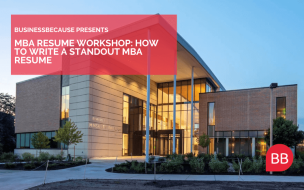“I wanted to study in London, I wanted a full-time MBA, I have friends who have studied there and their open evening was impressive,” said the applicant.
Ben was looking into a bevy of London-based business schools, part of a bid to advance his financial services career. After a lengthy spell advising offshore wind and other renewable energy clients with Aon, he was dead-set on an MBA degree.
“I was keen to find a new challenge that would stretch me and give me a broader outlook,” Ben said. He applied to both Cass and Imperial College Business School, another London stalwart, and was surprised at the depth of information he needed to produce.
The process was challenging. He had to file detailed questionnaires addressing his career to date, motivations, skills and areas of development – including two short papers all about Ben.
“Whilst the process was very time consuming and challenging, it was worth the investment,” Ben said, after gaining admission to both schools.
His application plight is shared by thousands. The deadline for application round-one submissions for the leading business schools is encroaching. Applicants will be sending their essays and application forms off next month in their droves.
Crafting a successful application is no easy feat. “I would strongly recommend that you start as quickly as possible. I only really committed to the process in March, for a September start date,” Ben said.
Admissions teams are hard to impress, and they only admit a small percentage of applicants – across the top-ranked schools the average is 46%, according to Businessweek rankings.
“We want someone who we can clearly see has strong leadership potential,” said Keegan Pierce, associate director of international admissions at ESADE Business School.
“Secondly, we want people who have international and cultural experience… Finally, not only must they demonstrate excellence within their profile, from university grades to standardised tests, but also understand the power of team work, sharing and collaboration with other individuals.”
A solid GMAT score and outstanding academic backgrounds are par for the course for most candidates – so diversity is often a key differentiator.
“This year we’ll have a news reader from India, an ex-professional hockey player, but also candidates from traditional industries like banking. We look to have a varied group of people in the classroom,” said Shane Moore, associate director of recruitment at the Sauder School of Business.
Additional degrees like chartered financial analyst or project management qualifications may help you stand out from the crowd, as will new cultural experiences and international travel.
But it can be equally important to show impact within your local community – demonstrating leadership qualities.
Michele Roberts, MBA program director at UWA Business School, said: “The UWA MBA is about developing global leaders, which means we expect our students to be culturally aware and ready to adapt to a changing business environment.”
The school, one of only a few in Australia to be internationally accredited by EQUIS and AACSB, has just launched a new full-time MBA program. To impress the admissions team, candidates will need to demonstrate strong interpersonal skills and leadership potential, Michele added.
It is a sentiment echoed by Shane at Sauder, one of Canada’s highest-ranking schools. “We believe that if you have those communication and interpersonal skills, we can help you develop into a strong leader,” he said.
According to Ben, candidates stand their best chance of gaining admission if they start the application process as early as possible. You can get the essays out of the way before committing to a program.
But some candidates fail to get their “story” across in their essays, said Keegan. “Often we want students who have thought through what their story is and how an MBA can help their long-term goals, and know how ESADE can help them get to where they want to be,” he said. “Some candidates don’t show that they’ve done their homework.”
You should choose your business school carefully, and ensure you craft a fresh application and individual essays for each school you apply to.
Shari Hubert, associate dean of admissions at the McDonough School of Business, said: “We look for inconsistences in the different aspects of the application process… We can tell if someone is copying and pasting the same information for different business schools and just changing the name of the school. Make sure the essay is tailored.”
The GMAT is still one of the biggest stumbling blocks. Test preparation involves a great deal of self-study and self-discipline, said Toby Blackwell, a professional GMAT tutor at Varsity Tutors.
Ben had just two months to prepare for his test. “I was a little concerned,” he said. At evenings and weekends, he learnt the syllabus and brushed up on his math skills. “About ten days before the test, I started to use the free online practise tests,” Ben added.
However Kevin Rocci, a GMAT expert at Magoosh, said you should not study for more than two or three hours. He added: “Set realistic goals for yourself and don’t shoot for the stars. Baby steps are the key to improvement.”
But arguably the most crucial stage is the interview. According to Keegan, candidates should start interacting with the admissions team long before sitting down for a formal meeting.
He said: “I suggest trying to contact ESADE students and alumni as much as you can… Try to reach out and see if they can answer questions about your experience, and sometimes they even give us feedback about the people they speak with.”
However Shari pointed out that the interview process is both a chance for the team to assess the candidate – but also for the applicant to assess the school.
“People should relax and look at the interview as a conversation and really try to get to know the admissions person in front of them,” she said.
“It’s the applicants opportunity to tell us and show us what is unique about them, and how they will stand out and be successful in our program.”
RECAPTHA :
2d
c5
16
b9








